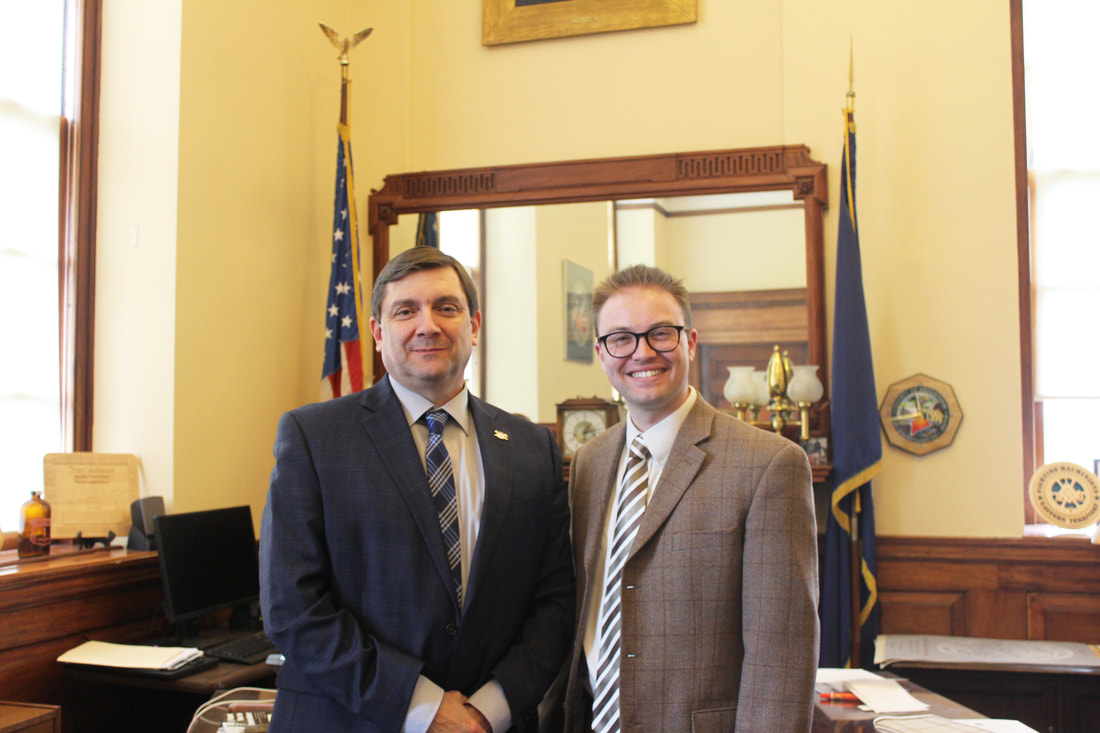|
AUGUSTA — Legislation sponsored by Sen. Justin Chenette, D-Saco, to reduce the outside influence of money and lobbyists in politics was approved by the Maine Senate today in a party-line vote of 21-13.
“Lobbyists shouldn’t have a greater voice than our constituents. Under current law, money grants them undue access to our elected officials,” said Sen. Chenette. “This bill represents a comprehensive overhaul of our campaign finance system and strengthens the integrity of state government.” LD 54 “An Act To Limit the Influence of Lobbyists by Expanding the Prohibition on Accepting Political Contributions,” would ban legislators, legislative candidates, the governor and gubernatorial candidates from accepting political contributions from lobbyists. It also would ban out-of-state lobbyist money from Maine’s political system. Candidate and elected official PACs, or political action committees, would also be banned from accepting lobbyist contributions. Currently, the only ban in place is for sitting officials while the legislature is in session. This bill expands the ban to be year-round. The bill was endorsed by the Maine League of Women Voters, Maine Citizens for Clean Elections, and End Citizens United. LD 54 bill is a part of Sen. Chenette’s campaign ethics reform package, which includes LD 76, “An Act To Strengthen the Integrity of the Legislature by Extending the Waiting Period before Legislators May Engage in Any Amount of Compensated Lobbying,” and LD 256, “An Act To Ban the Use of Leadership Political Action Committees for Personal Profit.” Both of those bills have been signed into law by Gov. Janet Mills. LD 54 faces further votes in the House and the Senate before heading to the governor’s desk. Sen. Chenette is the Chair of the Governor Oversight Committee, a member of the Senate Ethics Committee, and Co-Chair of the Democracy Reform Caucus.
0 Comments
The bill forms a stakeholder group to overhaul laws regarding bullying in schools AUGUSTA — On Tuesday, the Maine House voted in support of a bill introduced by Sen. Justin Chenette, D-Saco, to review and overhaul Maine’s bullying laws. The Senate voted in support of LD 1306, “An Act To Promote Safe Schools through the Creation of the Safe School Climate Council,” last Thursday.
“As someone who was bullied all throughout school, I know the long-lasting pain that bullying can cause,” said Sen Chenette. “I want to do everything I can to ensure young people feel safe in school, feel accepted, and feel like they can be true to themselves without fear of retribution from their peers.” LD 1306 directs the Department of Education to create a stakeholder group to recommend improvements to Maine’s bullying laws for schools. By February 2020, the Commissioner of the Department of Education will report the findings of the stakeholder group and its specific recommendations to the Education and Cultural Affairs Committee and the rest of the Legislature for further legislative action. The goal of this bill is to obtain data, analyze issues and report on solutions to comprehensively address how school districts across the state are responding to bullying in their schools. The bill is supported by the Maine Education Association. LD 1306 has received strong bipartisan support in the Maine Legislature. It now faces enactment votes in the Senate and the House AUGUSTA —Gov. Janet Mills has signed into law a bill from Sen. Justin Chenette, D-Saco, that defines clean drinking water as a public necessity. LD 1121, “An Act To Acknowledge Potable Water as a Necessity,” received the governor’s approval on Thursday.
“This bill starts to put us on a path of clearly defining access to clean drinking water as a universal human right within the state of Maine,” said Sen. Chenette. “Drinking water should be treated as a life necessity, because it is critical for life. Period. I’m glad that the Legislature and Gov. Mills have joined me in support of this.” Currently, there are discrepancies in state law that do not reference potable water when mentioning the necessities for life across departments and programs. This law addresses those omissions. In 2010, the United Nations General Assembly recognized that water and sanitation should be a human right. They went on to clarify that water as a human right is as much about ensuring the quality of water people have to access to meets a high standard, as it is about access to water. Sen. Chenette worked with the water-rights advocacy group Community Water Justice to introduce the measure. LD 1121 will go into effect 90 days after the Legislature adjourns sine die. Sen. Chenette is a member of the Environment and Natural Resources Committee. AUGUSTA — On Tuesday, the Maine House voted in support of a bill introduced by Sen. Justin Chenette, D-Saco, to ban automated and prerecorded voice robocalls to residential numbers in Maine.
“The state can’t sit idly by and wait for the federal government to act when small businesses are losing productivity, seniors are being scammed, and people are afraid to answer their phones,” said Sen. Chenette. “This bill gives the Attorney General’s office an important set of tools to prosecute robocalling, spoofing of numbers and telemarketing harassment.” LD 277, "An Act To Ban Telephone Solicitations Using an Artificial or Prerecorded Voice and Enhance Caller Identification," gives the Attorney General’s office the authority to enforce this ban on automated and prerecorded voice robocalls as an unfair trade practice, specifically on the grounds that the telemarketer’s intent is to defraud, cause harm or wrongfully profit off the communication. This bill would also treat interconnected voice over internet protocol and text messaging, which are types of telecommunication services, as telemarketing under the law and clarify misleading or inaccurate caller ID information. Nonprofits, services acting on behalf of nonprofits, telecommunications carriers, schools and emergency messages from government agencies will be exempt from the ban, as will individuals who give consent to receive this type of robocall communication. LD 277 has received strong bipartisan support in the Maine Legislature. It now faces enactment votes in the Senate and the House. |
Latest UpdatesArchives
June 2024
Categories |




 RSS Feed
RSS Feed
